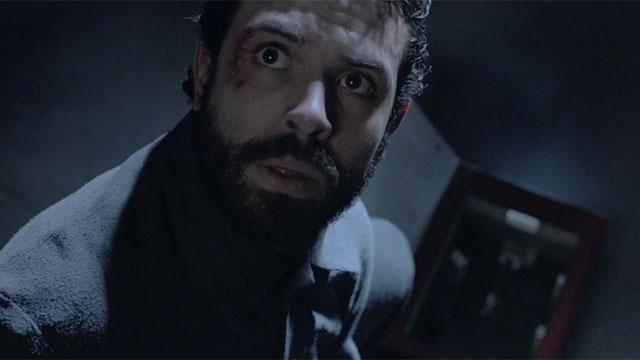The script is simple. It barely fills a page. It opens in an unspecified location on characters called only A and B:
A: We have to get out of this.
B: Why do you say that?
A: Look around.
B: How could this happen?
Then there is this note: Here, in 3 minutes or less, we see how A and B got into this situation. When we return to the present…
A: We’ll never get out.
B: That’s what you think. Watch this!
A: Don’t! … … … Are you happy now?
These few lines are written by Geoffrey Fletcher, who won an Oscar for his screenplay for “Precious: Based on the Novel Push by Sapphire,” and they form the basis of the five 5-minute films in the second edition of the Bombay Sapphire Imagination Series, which premiered at the Tribeca Film Festival and has now been released online.
It aims to promote emerging filmmakers, who are invited to submit variations of Fletcher’s script set in any location and any genre they choose. The winning scripts are professionally produced, with the aim of igniting the careers of those behind them. It’s an ambitious experiment but the ambition has already paid off. The best of the films from the first Imagination Series, “Room 8” by James W. Griffiths, won a BAFTA, the UK’s equivalent of an Academy Award.
This year’s films are, respectively, science fiction, fantasy, a rom-com, a drama and a thriller. (One of these descriptions is ultimately false but to reveal which one would spoil the biggest surprise in the series.) Like many short films by blossoming talents, they feature both noteworthy originality we hope the filmmakers will retain and clichés we hope they’ll outgrow.
“Exit Log” by Chris Cornwell deserves special praise for being a sci-fi film that passes the Bechdel Test and that makes us wonder why other films of its kind can’t. But it begins too slowly for a short film, and particularly for one seen alongside “Graffiti Area” and “The Other Side of the Game,” which both have sprinter’s starts.
There is a long establishing shot of a spacecraft that apes “2001: A Space Odyssey” and exists chiefly so that exposition can be written onscreen. Once the action starts, however, it is truly original. “Exit Log” is the film that handles its mandatory flashback most cleverly, by taking the idea of flashing back literally: it concerns a time machine that allows the protagonists to jump three minutes into the past. The implications of this become increasingly worrying until, at the end, the tension is remarkable for a film with so short a lead-in. Though it has the weakest start of any of the films, “Exit Log” has the strongest finish. The graceful final shot conveys more information, and has more emotional resonance, than any other shot in the series.
“Graffiti Area” by Maite Fernandez Perez opens with two graffiti artists running, we presume from the police. Then, in the first of a couple of shocking reveals, we learn they are running from their graffiti itself, which has inexplicably come to life. The film could have been a pulse-raising pre-credits sequence for an episode of “Doctor Who” and could be a metaphor about the escapism offered by art.
The high production values of the Imagination Series raise the films in it above most shorts by aspirant filmmakers but, ironically, it is those high production values that weaken “Graffiti Area.” The living graffiti seems to be CGI and feels too flawless, and too obviously false, to be threatening—especially in contrast to the celebrated 2008 short “Muto,” http://vimeo.com/993998 which ingeniously combines hundreds of actual graffiti paintings to create art that seems like it really could leap off the wall.
While the metaphor in “Graffiti Area” is opaque, the metaphor in Anthony Khaseria’s “Reflections” is more obvious and is stressed too often. Khaseria shows us a couple who feel trapped in their relationship. They discover two living reflections of themselves trapped in a full-length mirror in a story that’s deliberately dark and strange, and recalls the unnerving surrealism of “Room 8.”
But while “Room 8” is artful enough that its bizarre situation—a prisoner desperate to find out what is inside a mysterious box—is able to surprise us throughout the film, in “Reflections” our minds run ahead of the screenplay: we infer everything we come to know about these characters from the opening scene. The subsequent scenes just reiterate it.
In contrast, “The Other Side of the Game,” by Kiara C. Jones, causes us to re-evaluate everything we learn about its characters—a man and a woman apparently in fear of their lives after hooking up at a party—until its last moments. It plays like an expertly constructed commercial. If that seems like faint praise, it shouldn’t: commercials are the most widely seen short films in the world and to make a memorable one is to strike gold.
Allyson Morgan’s “Need for Speed (Dating)” is the one flat-out comedy in the selection, though it has a bittersweet edge. It’s clear Morgan would like to write and star in a sitcom, and her film could almost be its pilot. It’s often charming and inventive but at times is too much like sitcoms that already exist: the stream of comically unappealing dates the lead character sits opposite is too much like the standard montage of bad speed dates that features in so many TV comedies.
Morgan’s film ends, as all the films do, with the line “Are you happy now?” It’s exciting to anticipate the context in which they’ll be spoken and the inflection they’ll be given. Across the series, the final line becomes a philosophical question, an angry insult and a punch line. It demonstrates the divergent possibilities in each line of dialogue in a decent script, and the different meanings an actor, a director and even a set designer can give it. This is the value of the Imagination Series. It helps us think not just about films but about filmmaking, from the script up.












